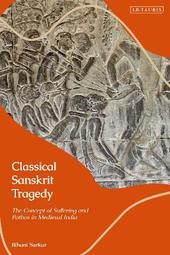
|
Classical Sanskrit Tragedy: The Concept of Suffering and Pathos in Medieval India
Hardback
Main Details
| Title |
Classical Sanskrit Tragedy: The Concept of Suffering and Pathos in Medieval India
|
| Authors and Contributors |
By (author) Bihani Sarkar
|
| Physical Properties |
| Format:Hardback | | Pages:224 | | Dimensions(mm): Height 234,Width 156 |
|
| ISBN/Barcode |
9781788311113
|
| Classifications | Dewey:891.209 |
|---|
| Audience | | Professional & Vocational | |
|---|
|
Publishing Details |
| Publisher |
Bloomsbury Publishing PLC
|
| Imprint |
I.B. Tauris
|
| Publication Date |
25 February 2021 |
| Publication Country |
United Kingdom
|
Description
It is often assumed that classical Sanskrit poetry and drama lack a concern with the tragic. However, as Bihani Sarkar makes clear in this book, this is far from the case. In the first study of tragedy in classical Sanskrit literature, Sarkar draws on a wide range of Sanskrit dramas, poems and treatises - much of them translated for the first time into English - to provide a complete history of the tragic in Indian literature from the second to the fourth centuries. Looking at Kalidasa, the most celebrated writer of Sanskrit poetry and drama (kavya), this book argues that constructions of absence and grief are central to Kalidasa's compositions and that these 'tragic middles' are much more sophisticated than previously understood. For Kalidasa, tragic middles are modes of thinking, in which he confronts theological and philosophical issues. Through a close literary analysis of the tragic middle in five of his works, the Abhijnanasakuntala, the Raghuva?sa, the Kumarasambhava, the Vikramorvasiya and the Meghaduta, Sarkar demonstrates the importance of tragedy for classical Indian poetry and drama in the early centuries of the common era. These depictions from the Indian literary sphere, by their particular function and interest in the phenomenology of grief, challenge and reshape in a wholly new way our received understanding of tragedy.
Author Biography
Bihani Sarkar is Associate Faculty Member of the Oriental Institute, University of Oxford and Research Member of the Common Room, Wolfson College, University of Oxford. She is the author of Heroic Shaktism: the cult of Durga in Ancient Indian Kingship (2017).
ReviewsTragedy-the moral imagination it engages and emotional impact it delivers-has long been considered a unique achievement of Western culture. Sarkar confronts this cliche head on, by a subtle rethinking of the tragic itself-as something experiential rather than formal-and a wide-ranging and acute analysis of classical Sanskrit literature. A searching inquiry into the profound reflections of Indian poets and thinkers on the nature of human existence. -- Sheldon Pollock, Arvind Raghunathan Professor of Sanskrit and South Asian Studies, Columbia University, USA Sarkar gives us a fresh and original reading of Kalidasa's works, these great classics of Sanskrit literature-a new reading that is sensitive and intelligent at the same time. She focuses on the "tragic middle" in these works, presents the reader a study of the revolving wheel of human existence and gives us a finely detailed topography of the map of melancholy. This "tragic middle" is also a study of a severe human crisis in knowing, a rupture in clear awareness, and of the unfolding of recognition. On the other hand, it is a second birth, a maturing and transformative test for the characters. Sarkar's sympathetic and insightful analysis enriches our understanding of the many aspects of tragedy in works of classical Sanskrit literature. -- Csaba Dezso, Eoetvoes Lorand University, Hungary
|